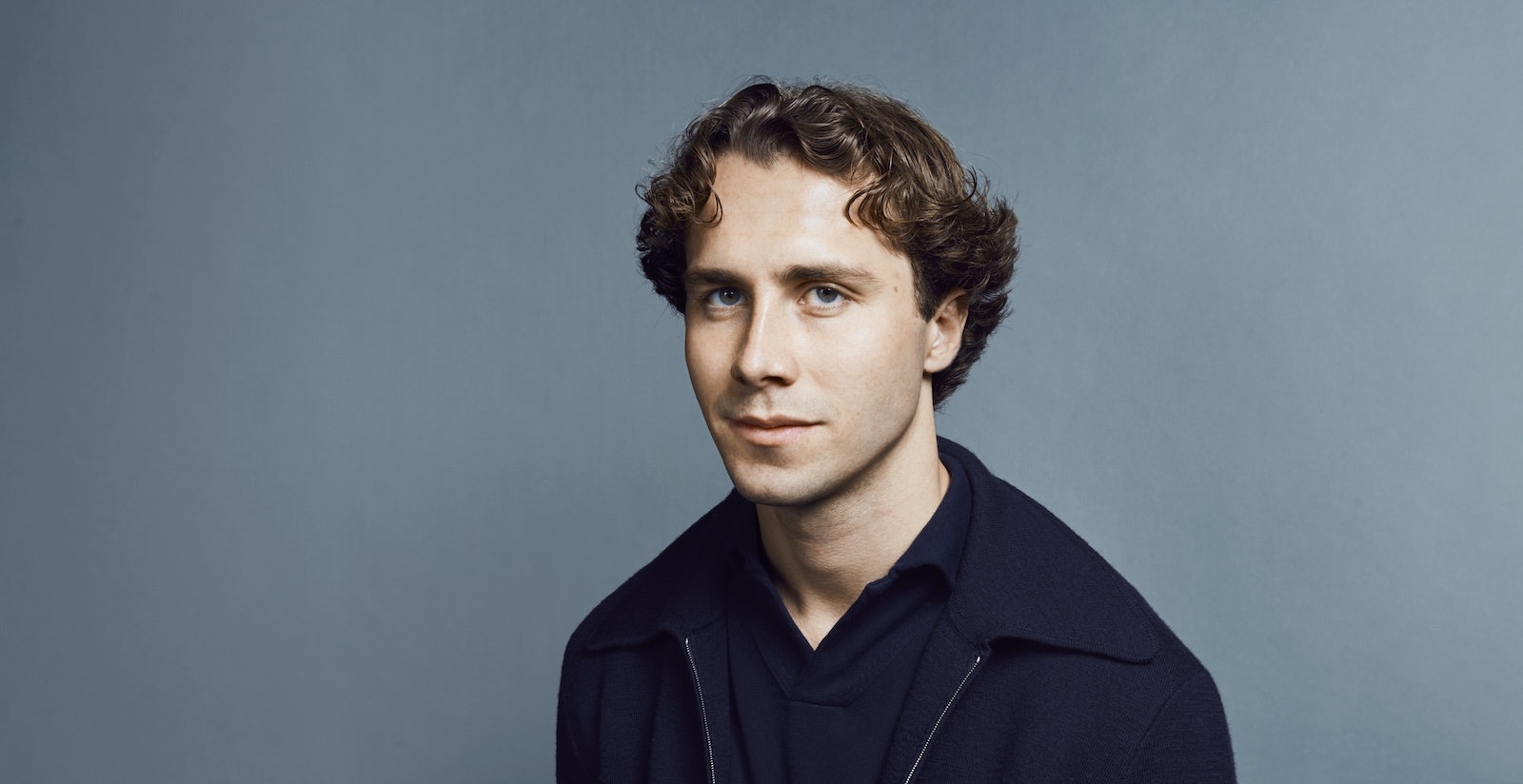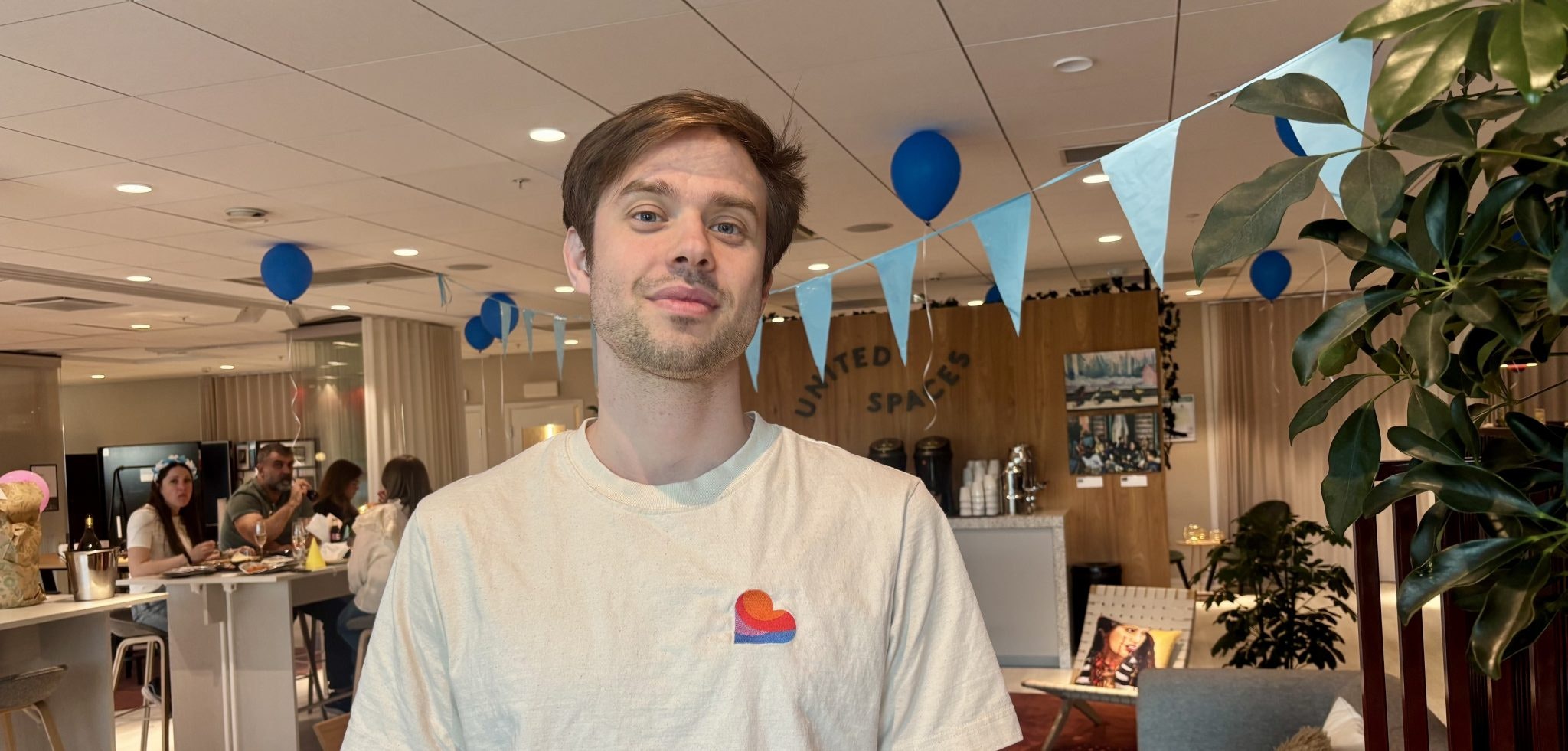Anton Osika appears wearing a Lovable-branded T-shirt and a pair of dark jeans. We are at the coworking space United Spaces, a stone’s throw from Central Station in Stockholm. It’s Friday lunchtime and the workspace is organising some sort of celebration with blue balloons and possibly Mexican music.
Osika is a bit rushed. “Do you have any food preferences?” he says, holding up two vegan salads.
When the answer is no, he runs back to the staircase to head to another floor where Lovable’s 30-odd employees are working, to drop off a vegan lunch for a colleague. I’m not disappointed when I get a chicken salad instead.
Lovable is the latest poster child of European AI startups. The two-year-old startup has developed an AI tool that enables people without coding skills to create websites within minutes. Within the last six months, the company has climbed up to $50m in annual recurring revenue, and investors, startup operators and even kids seem crazy about it.
Everyone wants to have a piece of its cofounder and poster boy, Osika, Sifted included.
The longevity thing
Osika returns and slumps down next to me on one of the curved sofas. “So, you are vegan,” I say, just to start the conversation. “Yes, and now you want to know why,” he says, half as a question, half as a statement.
I never really cared why people are vegan, but perhaps there’s something in it, so I prod him to explain.
“It just makes [things] easier,” he says. Plus, it’s better for the planet, and “as Bryan Johnson found, it’s better for me”.
For those who don’t remember, Bryan Johnson is the 40-something billionaire who has become the face of longevity for striving to look and feel half his age.
“Yes, I’m one of those tech bros who are longevity fans,” says Osika with a smile. When asked how old he is, he replies, “I don’t tell people that anymore.” (He’s 34.)
He’s not alone in being a fan of longevity. In Stockholm, there’s a wave of startup founders increasingly interested in healthtech and longevity in particular. Kry cofounder Johannes Schildt has recently started an MRI scanning and analysis startup with his girlfriend Julia Elf; Voi cofounder Douglas Stark has launched an MRI brain-scanning startup to improve brain health; and Daniel Ek and Hjalmar Nilsonne’s Neko Health needs little introduction.
Osika started to get interested in longevity as a teenager when he began exercising. He found that there’s a lot of information on how to optimise your health, and since he’s “a nerd”, he started reading up and cross-referencing it with academic research.
“I can get caught in a rabbit hole and read up on everything about a topic. I think if I had used that time to work out and sleep, it would have been better for me,” he says.
Like many tech people in Sweden, Osika wears an Oura ring to measure his sleep, exercise and stress levels. But for him, it’s more than just a health tracker. “It’s actually my engagement ring,” he says.
The hacker house in Old Town
Osika’s wife, Dora Palfi, is also a well-known tech talent in the Stockholm ecosystem. She’s the founder of edtech startup Imagilabs, which encourages girls to learn how to code in Python.
The couple are both working long hours. Osika says he recently cycled over to her office after midnight and found her still there working.
They live in a co-living house in the Old Town of Stockholm. “It’s the first hacker house,” Osika says.
But he isn’t getting to enjoy the social side of the set-up at the moment. “I can just stay until 10 in the office and get the social aspect of life from there,” he laughs. “I feel somehow like a really bad housemate since I work so much.”
Whilst Palfi is spending a lot of time in the US now with her startup, Osika says there is no plan to move Lovable or the core team across the Atlantic.
“We have many of our customers in the US, so we need to be close to them, but I believe the core of Lovable will stay European,” he says.
Growth across all platforms
Although Osika isn’t in the US much in person, he and Lovable are definitely all over the place digitally.
According to a LinkedIn post by investor Guillermo Flos, Lovable is using more than 12 growth channels at the same time to market themselves — including social media and podcasts, Hubspot, Google and Product Hunt — and adds about 1,500 customers a day.
The buzz hasn’t come for free. In the early days, Osika was eager to get in touch with the media to tell his story. Now it’s journalists — and investors — chasing him.
Three months ago, Lovable raised a $15m Series A led by Creandum with participation from angel investors like Meta board member Charlie Songhurst, Quora’s Adam D’Angelo and Thomas Wolf of Hugging Face. Rumour is that a Creandum partner waited outside the team’s office for hours on a chilly Swedish day to win the deal.
One investor that wasn’t on the shareholder list then is the US investor Andreessen Horowitz, which has been snooping around the company. It organised a hackathon with the startup in Stockholm and added Lovable to its roundup of AI web app builders earlier this year.
Other investors have decided to get even closer to the company; former 20VC partner Elena Verna announced she’s joined the startup as head of growth and marketing last week.
Chiapudding for two years
Lovable is not Osika’s first startup. He was the first employee at Swedish AI startup Sana, founded by Joel Hellermark in 2016.
“Anton is a brilliant thinker and was early onto AGI [artificial general intelligence],” Hellermark says. “When I met him at [the grassroots organisation] Stockholm AI in 2017, we were eight people sitting around eating pizza and reading research papers.”
As Sana’s first employee, Osika had big dreams of what AI could do for humanity, but at the same time spent hours hacking away, says Hellermark.
“He had a natural way of knowing how to build a company, and I knew that if he had his own company, at least it wouldn’t lack ambition,” Hellermark adds.

Osika had his quirks too.“He was very contrarian. He used to code on his bike and ate the same thing for two years – chia pudding, I think it was,” Hellermark says. “You can imagine the stock of chia we had at work.”
Once Osika was asked to organise an after-work drink at Sana. “He came in with a plastic bag with four beers,” Hellermark says, laughing as the memory comes back to him. “We were a team of 20.”
Sana has pivoted and changed over the years, and when the focus shifted somewhat away from AI development, so did Osika.
Joining Depict as cofounder
In 2020, he joined Depict as CTO and cofounder alongside Oliver Edholm. Depict was and still is a startup helping ecommerce companies with AI-led visual merchandising.
It was accepted into Y Combinator the same year. The experience “levelled up the idea of what it should be to build a company,” says Osika.
“It wasn’t like it often is in Sweden — where it’s, ‘this is how you build a company.’ Instead, it was: ‘If you want to be the best and the biggest, you need to think outside the box’.”
Depict went on to be backed by Tiger Global, EQT Ventures, Initialized Capital, Northzone and Y Combinator.
Osika built up the company’s engineering team, with people who have gone on to build other startups, such as AI legal tech startups Legora and Vesence and AI medical note-taker Tandem Health.
“There are more. It’s like a mafia,” Osika says with pride.
Building the first version of Lovable
But in 2023, Osika had found a replacement for himself working with product and went back to steer engineering. This was when he decided to introduce the new generation of AI to its software development.
“My thesis was that AI has a huge impact on building good products. There were already some large language models, but about a year ago they started to be good for software development,” Osika says.
And whilst Osika believed that he could increase the productivity of his 15 engineers with a GenAI tool, people questioned his theory that LLMs could be used for software development. He decided to prove that it worked: “I took a weekend or two to build it.”

The first version of Lovable — originally a source-coding companion tool called GPT Engineer — had “legs”, as Osika puts it, and led to other products on the market, sparked on by the open source model.
“After a single tweet, GPT Engineer became the most popular AI code generation GitHub project, almost overnight. And I became a celebrity — not just among engineers — but among all top global VCs and even the taxi drivers I met in San Francisco,” Osika told me in an email last year.
Not cutting–edge enough
When he created GPT Engineer, Osika didn’t have a company in mind. But as the days went on, he began to question his future at Depict.
“I was thinking that in the next decade, humanity is going to be completely transformed. Am I doing what I can to have the most impact?” he says. “It wasn’t cutting-edge AI.”
Looking back, Osika says he feels like he should have done more to leave Depict in the best shape possible, although he says that he doubts that there was anything he could have done.
“It’s easy to have afterthoughts, but that is one of the thoughts that keeps coming back,” he says.
Osika has come to represent a new kind of founder in Stockholm – similar to his founder friends at Legora and Tandem Health. They have, as Hellermark put it, “a more aggressive approach to growth.”
Although Lovable is only a couple of years old, its founder has become a role model for many Scandinavian startup founders. But meeting Osika in person, he doesn’t leave you the impression of an arrogant tech bro but a founder who is under increasing pressure to make the right decisions for his company and the team.
“My stress levels were lower before. The setbacks get bigger, and a mistake now can mean that we lose x millions. The same if I decide to do the wrong thing out of two,” he says.
“You just have to build greater resilience rather than beating yourself up.”
After a few failed attempts to take a good photo, he needs to rush off for his next appointment. I leave the coworking place with the Mexican party and the balloons behind.
Read the orginal article: https://sifted.eu/articles/big-interview-lovable-anton-osika/


